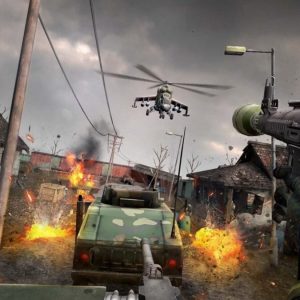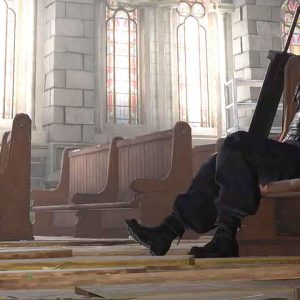If you could hire any director to make an Elden Ring movie, who would you pick?
You might settle for fantasy heavyweights like Peter Jackson or Guillermo del Toro, or maybe you’d tap Miguel Sapochnik, the man who brought you many of Game of Thrones’ biggest battles, including Hardhome and Battle of the Bastards. If you’re looking for something a little more avant-garde, you could even pick Robert Eggers (Nosferatu), Yorgos Lanthimos (Poor Things), or Bong Joon Ho (Mickey 17) – filmmakers who, like Elden Ring developer FromSoftware, relish in the surreal, cryptic, and uncanny.
Chances are, you wouldn’t pick Alex Garland. The British writer and director is known for the grounded, slow-burning science fiction dramas Ex Machina and Annihilation, as well as the inventively named war films Civil War and Warfare – none of which resemble FromSoftware’s work in any notable way. However, Garland is precisely who film studio A24 has selected to adapt Hidetaka Miyazaki’s magnum opus for the big screen. Considering Garland – who, in addition to directing, is also set to write the screenplay – isn’t one to take his multi-digit checks and phone it in, you have to wonder how he’ll try to make this work.
At a glance, Garland and Elden Ring do indeed seem like an odd match. Despite his considerable experience with sci-fi, Garland has yet to try his hand at hardcore fantasy – a tricky genre in its own right, and even trickier when dealing with video game adaptations. On top of this, his style doesn’t have a lot in common with FromSoftware’s. The narratives of Ex Machina and Annihilation are rooted in plot, dialogue, and characterization, while games like Dark Souls, Bloodborne, and Elden Ring tell their stories largely indirectly, through item descriptions and environmental design. (Civil War, set in tomorrow’s United States, was widely criticized for its lack of deep backstory).
But just because Garland has never made a fantasy film, doesn’t mean he can’t. He’s reinvented himself and ventured out into new frontiers before – Civil War and Warfare are radically different from Ex Machina and Annihilation, which are themselves unlike the films he wrote before making his directorial debut – so who’s to say he won’t do so again?
Actually, making an Elden Ring movie wouldn’t entirely constitute uncharted territory for Garland. Many people – including his own fans – don’t know this, but he’s actually an avid gamer. His experience playing the Resident Evil games apparently inspired his script for the 2002 horror 28 Days Later, and the 2000 film The Beach – based on one of his novels – features a game-inspired scene which Polygon’s Matt Patches described as “the closest thing we will ever get” to a Banjo-Kazooie movie starring Leonardo DiCaprio.
While many filmmakers seemingly feign interest in the material they’re hired to adapt in order to placate said material’s existing fanbase (to this day I refuse to believe M. Night Shyamalan watched even a single episode of Avatar: The Last Airbender), Garland’s love for The Last of Us, BioShock, and – most importantly – Dark Souls seems to be sincere. He appears to have a decent grasp of what makes the series unique and special compared to other games. Talking to Gamespot back in 2020, Garland said, “The Dark Souls games seem to have this kind of embedded poetry in them. You’ll have some weird bit of dialogue with some sort of broken soul sat outside some doorway and it feels like you’ve drifted into this existential dream.”
Sticking to this image of an “existential dream,” Garland could take his Elden Ring adaptation in the direction of Annihilation, which upon release was praised for its psychedelic visuals. This would work, but it is not the only path forward. Another less obvious but arguably more effective plan of action would be to adapt Elden Ring in the mold of Warfare, Garland’s nail-biting thriller about Navy SEALs fighting in Iraq. I say this not because there is something fantastical about this film – on the contrary, it’s been marketed as the one of the most realistic war films ever made – but because watching it evokes surprisingly similar feelings to those you experience while playing Elden Ring: outnumbered, outmatched, overwhelmed, afraid for your life (or runes).
Swap the war-torn Iraqi town of Ramadi for the ruins of Limgrave, alleyways of Leyndell, or badlands of Caelid, and what you’re left with is a film that adapts not the game’s encyclopedic, overarching backstory – the backstabbing saga of Marika, Godrick, Radagon, and the Demigods – but the minute, moment-to-moment experiences of the player’s Tarnished character wading through the Lands Between, so caught up in reaching the nearest Site of Grace in one piece that they have completely lost sight of their larger quest to become Elden Lord, whatever the hell that means.
Given that Garland is reportedly looking to cast one of the actors from Warfare – Kit Connor – in the lead, it’s possible that his Elden Ring adaptation will end up adopting a similarly suspenseful tone, not to mention retread those themes of fear, despair, and senseless violence that Connor has already proven himself capable of conveying. Using Warfare as a blueprint for Elden Ring would not only take advantage of Garland’s strengths as a filmmaker who explores psychology through graphic, carefully choreographed action, but also follow the example set by the – fight me – only solid video game adaptation out there, season one of HBO’s The Last of Us, whose quality is in large part derived from the fact that its creators understood what made the original great as a game.
Elden Ring, like FromSoftware’s other games, is not a power fantasy where heroes with supernatural abilities beat up giant monsters through flashy cutscenes and epic quick time events. It’s an anti-power fantasy that reduces players to nameless warriors who become well-acquainted with death and bang their head against the fog wall until they finally succeed. For Garland’s adaptation to reach the heights of his previous films, he’d do well to capture that bittersweet sentiment. And through his work on Warfare, we can catch a glimpse of what could be when Elden Ring finally arrives in cinemas.
Tim Brinkhof is a freelance writer specializing in art and history. After studying journalism at NYU, he has gone on to write for Vox, Vulture, Slate, Polygon, GQ, Esquire and more.
























